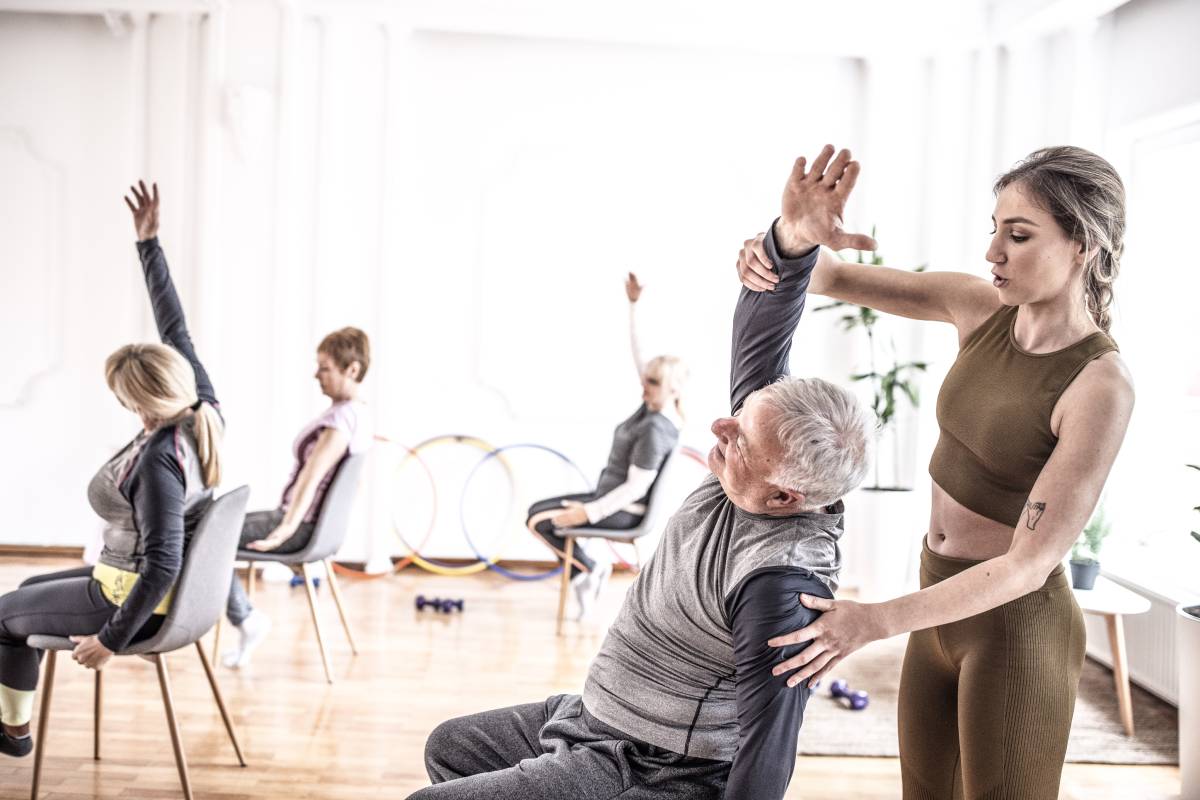I was invited to teach chair yoga to a lung cancer survivor group at a small regional hospital. Two survivors were in attendance: one with their brother and one with their husband. We started as I always do in yoga: sitting, breathing and becoming in tune with the body. After gentle warm-ups, we moved into subtle breathwork. I watched as survivors, who at one point struggled to breathe, sipped in slow, deep breaths through their nostrils.
As a few participants seemed a bit uneasy, I offered a gentle reminder: there’s no need to get it ‘right’—just to stay present. I invited them to shift to a more comfortable breath or movement, and to rejoin the group when it felt right for them. I watched their shoulders visibly relax when they realized they were capable of practicing chair yoga.
I admired their strength and adaptability. The same resilience that they used to navigate their health condition was reflected in their approach to new poses or mind spaces during practice. By the end of class, there was a collective sense of ease.
After class, they shared stories about how they cook for each other, checking in with texts and cards, and visiting when someone is unwell. That kind of connection—checking in, caring for one another, sharing life beyond the class—isn’t just heartwarming; it’s sustaining. It gives them a reason to show up, not just for themselves, but for each other.
This kind of social support is at the heart of why exercising together may be more powerful than exercising alone.
Why exercising together may be better to exercising alone
You’ve probably heard your doctor say in some form, “You need to exercise”. Some people seem to effortlessly incorporate daily exercise into their lives. But for many, it’s not that easy.
For those who struggle to consistently show up for themselves, it may be easier to show up for others. This is the idea of social capital, or positive peer pressure. Some of us may recall the middle school pressure to dress or behave a certain way. Turns out we can use that same psychology to our benefit.
Accountability through social capital
When you sign up for a group class, you’ve committed to the instructor that you’ll be in attendance. Whether you realize it or not, both the teacher and the other participants are holding you accountable. If you don’t show, there’s no real penalty, but you will be missed, and you may experience regret.
These emotions are temporary and pass quickly, but perhaps they’ve left you with stronger motivation to be sure you attend next time. When the social capital, being there for your instructor or classmates, outweighs the need to complete your never-ending to-do list, watch TVor scroll on your phone, that’s when you start to show up and take care of yourself. One good move builds into many other self-care habits.
Financial accountability
A large barrier to exercise is cost. Gym memberships can be expensive. Thankfully, there are many free group exercise classes, but they can be hard to find and may be inconsistent. It’s important to consider that paying for an exercise class makes you more likely to attend and show up for yourself. This is financial accountability.
Try thinking about what motivates you most to stick with something. For some people, losing twenty dollars isn’t a big deal. For others, there’s no way they’ll “throw away”money for a class. This can lead to consistent behavioral changes, improving your overall health and well-being. Knowing what pushes you to show up can help turn good intentions into healthy habits.
Mirroring and unity
Group exercise involves performing movements in unison. You are often mirroring or mimicking the teacher and other participants. As the saying goes, “imitation is the sincerest form of flattery,” but it’s also a powerful brain tool. Moving in sync with others can trigger feel-good hormones and boost your mood.
This kind of mirroring also strengthens your mirror neurons, which are linked to improved learning and memory. It improves the brain’s neural mapping of the body, linking what you see to what you feel. This enhanced body awareness can make you more likely to notice when something’s off and to seek care.
Adjustments/corrections
Another benefit of group exercise is that a teacher watches your movement and can step in if something looks unsafe. When you exercise alone, even at the gym with people nearby, you are unlikely to get helpful feedback on your form. In a group setting, the instructor’s guidance helps protect you from injury and ensures you’re moving in a way that supports your body.
How group exercise classes are pseudo-support groups
Many of us are still working to shake off our post-COVID isolation, working to reconnect and rebuild our sense of community. When practicing in a group, there is an inherent interconnectedness and “unity-consciousness” that forms. This is called groupthink. Getting on the same brain wave and having something to connect about can bring us together, despite our differences.
Many times, after class, people will hang back to chat with each other. This small talk can grow into friendships and lead to more people you can count on. If done with the right mix of intention, purpose, compassion, and love, group exercise classes can feel more like a supportgroup.
When to seek out a support group
Support groups are formal or casual gatherings of people who share similar life experiences and meet regularly to talk, listen, and support one another. In today’s often independent world, a support group can feel like a “chosen family.”
Most groups include a coordinator, someone who may not have lived the experience themselves but is trained or knowledgeable about the topic. Groups also include longtime members who’ve learned to manage their challenges, as well as newcomers just starting their journey.
Some common types of support groups include:
- Caretaker Support Groups,
- Paralysis/Wheelchair Users Support Groups
- Cancer Survival Support Groups
- PTSD Support Groups
- Addiction Recovery Support Group.
If you’re experiencing a sudden change or stressor in your life, a support group may be right for you. Members experience healing knowing that they’re not going through it alone. Participants will often go on outings with each other outside of the sessions to form a greater community to access assistance when you need it. Reach out to your primary care doctor or local hospital resource center for a list of support groups or group exercise classes!



